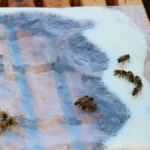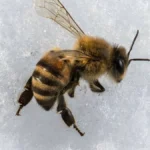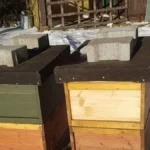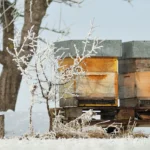Do bees stay in their hives in the winter? This will depend on where you stay. In the colder parts of the world, yes, in the warmer parts of the world, no. We will explore this a bit more and look at whether bees hibernate, and other interesting facts around what our amazing little friends do in winter.
To understand how bees deal with winter we need to divide the world into three broad regions from the perspective of bees.
Very Cold Winter Regions
There are parts of the world where for a couple of months of the year, bees will not be able to leave the hive due to temperatures being so cold that the ecosystem is essentially frozen. Bees in these areas have to have certain adaptations to survive. Here we are looking at places where there is snow on the ground or freezing conditions for a few months of the year. The northern parts of the US and the interior, Canada, Northern Europe, Russia, and such places.
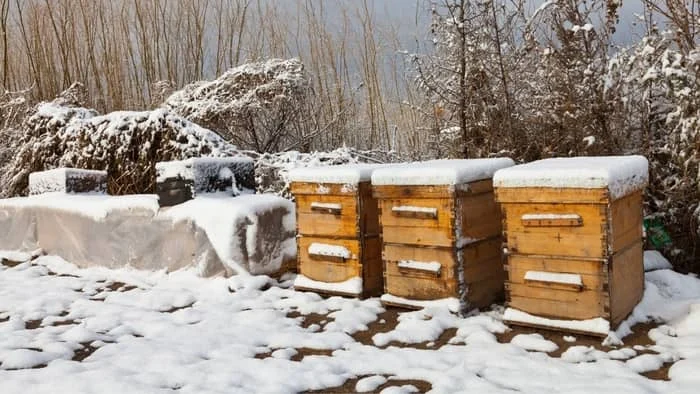
Learn more about: When To Add A Second Brood Box
Moderately Cold Winter Regions
In moderately cold regions where there can be a few days in any month when it is not freezing and the bees can get out and about and do a little bit of pollen gathering and clean up the hive. These areas are easier on the bees.
Places Where Bees Can Work In Summer and Winter
In these regions, bees can fly year-round. This means that if something is flowering, they will be able to collect a bit of nectar in order to keep the hives going in winter. With trees such as Eucalyptus or Canola plants, bees can actually produce their strongest honey flows in the middle of winter.
How Do Bees Get Through The Winter In Very Cold Regions?
For very cold regions it is important to prepare the bees for winter. Depending on your area, you may wish to wrap the bees in insulating materials. In these regions it is important to make sure the bees have adequate stores to survive the winter. Local beekeeping associations will be able to tell you how many pounds of honey a hive needs to survive winter. Feed your hives to this weight.
Candy Boards
In colder areas I am a huge fan of candy boards. These serve a double purpose. They provide the bees with supplemental sugar in the winter. They also trap condenstation in the hive – sugar crystals trap condensation and become sugar droplets. The bees consume this sugar and use it to keep alive. Without this moisture absorption condensation would form on the hive and harm the bees.
In these regions, the bees will actually shut down most of their brood rearing for a few months of the year. Bees suited to cold climates have to be genetically adapted to do this. Your local beekeeper’s association will list the races and local strains which have the best survival rates in your region.
Keeping Bees Inside For Winter
There are beekeepers in colder climates who have experimented, and in some cases succeeded at keeping bees indoors in winter. In these situations, they take the bees and actually place them in sheltered places to overwinter. The majority of beekeepers I have spoken to have greater success with wrapping bees and placing them outdoors in sheltered areas.
Even in very very cold weather, you will see a bee pop out of the hive every now and then to perform some mystery activity it only knows what it was doing. There is some evidence to suggest that the bees also measure the length of day, and hence are able to tell when the days start lengthening again and can begin rearing more brood. Keeping bees indoors can reduce their ability to detect the daylight.
How Do Bees Get Through The Winter In Moderately Cold Winter Regions
In these regions, it is also important to prepare your bees for winter, although wrapping the hives may be less important. Making sure that hive weights are correct to have enough stores, and installing candy boards is important.
I have seen bees in February in Boulder that would shoot out for an hour or two, while the ground was still covered in snow and collect poplar pollen. In areas where climatic anomalies can create a few days of warm weather in the darkest days of winter, the bees will sometimes take this opportunity to clean dead bees out of the hive and go and take a poop. You will see the yellow snow spots from this.
In these regions, it is generally important to keep bees which can reduce the brood nest in winter to a bare minimum. Bees which can form a winter cluster and are locally adapted will have the highest survival rates.
How Do Bees Get Through The Winter In Places Where Bees Can Work In Summer and Winter?
To many people, this sounds like a simple easy situation for the bees. Basically, they can get a few hours of foraging in in even the coldest days in winter. Or they can at least leave the hive to perform toilet and undertaker duty.
It is however still important to make sure that you go into winter with a good knowledge of the winter nectar map in your area. If there are not strong winter honey flows, you may look at candy boards as a management tool. Ensure that your hives are fed, then seal all cracks and crevices in your hives with clay. This prevents robbing.
In areas where bees have Africanized genes or are African bees, it is especially important to ensure your hives have adequate stores going into periods of nectar dearth. If the bees do not have stores, and they cannot use their stores to fund pollen gathering, they will shut down their brood nest and will abscond. Then you lose the hive.
We hope this article has helped you understand the different strategies for getting through winter with your bees. Please share if you found this helpful.
Read more about: When Do Bees Go Away?

Dr. Garth A. Cambray is a Canadian/South African entrepreneur and beekeeper with 28 years of experience in apiculture and specializes in adding value to honey. His Ph.D. research developed a new advanced continuous fermentation method for making mead that has resulted in a number of companies globally being able to access markets for mead. His company, Makana Meadery, exports honey mead to the USA where it is available to discerning connoisseurs. He has also developed technologies to commercially manufacture organic honey vinegar in Zambia for export globally. He holds a few patents globally in the ethanol industry and believes in technology and knowledge transfer for human development and environmental sustainability. One of his proudest achievements is the fact that the wind farm he started at one of his old apiary sites has essentially made his hometown carbon neutral.


